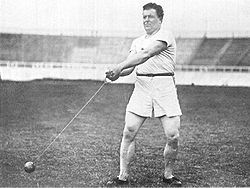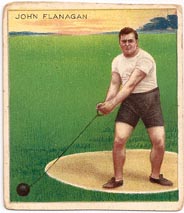John Flanagan (hammer thrower)
 Flanagan posing with 16 lb. hammer weight in 1908 | ||
| Medal record | ||
|---|---|---|
| Men's athletics | ||
| Representing the | ||
| Olympic Games | ||
| 1900 Paris | Hammer throw | |
| 1904 St. Louis | Hammer throw | |
| 1908 London | Hammer throw | |
| 1904 St. Louis | Weight throw | |


John Flanagan (John Joseph Flanagan; January 9, 1873 – June 3, 1938) was a three-time Olympic gold medalist in the hammer throw: 1900, 1904, and 1908.
John Flanagan was born in Kilbreedy, County Limerick, Ireland on January 9, 1873. He emigrated to the United States in 1896. At that time he already held the world record for the hammer throw. He competed for both the New York Athletic Club and the Irish American Athletic Club. He was part of a group of Irish-American athletes known as the "Irish Whales."
In 1900 Flanagan represented his new country at the Olympic Games in Paris, France. Flanagan, the only non-college man to medal for the Americans, outdistanced American athlete Truxtun Hare by 4.75 meters in the hammer throw. Hare and Josiah McCracken, both college football players from Pennsylvania, took silver and bronze. Flanagan also competed in the discus throw, finishing seventh.
Flanagan joined the New York City Police Department in 1903. His first assignment was the Bureau of Licenses, where he had little to do and could take time off to train and compete.
In 1904, sporting the Winged Fist of the Irish American Athletic Club in St. Louis, Missouri Olympic Games Flanagan set a new world record of 168 feet, 1 inch. He placed second to Etienne the Gendarme in the 56-pound throw event.
In 1905, while attached to the 37th Precinct, Flanagan competed in the Police Athletic Association games held at Celtic Park Queens, New York. "Not only did he win four of weight-throwing events, but, as if to show that he could do a little sprinting as readily as he can outclass his competitors with the 16 and 56 pound weights, he not only had the temerity to enter the fat men's race, but actually won it," giving him a total of five first place victories, "a most commendable showing, for there were many mighty policemen arrayed against him."[1]
In the 1908 Olympics in London, Flanagan broke his own record with a hammer throw of 170 feet, 4.5 inches.[2] The silver that year went to another New York City police officer, the former record holder Matt McGrath. John Flanagan competed in the tug-of-war as well.
On July 24, 1909, Flanagan set his last world record in the hammer, with a throw of 56.18 meters.
Flanagan quit the police force in 1910, after his "public office" squad was abolished and he was transferred to the West 68th Street Station and forced to walk a beat along Central Park West. That gave him no time to compete, and kept him up late. He left the U.S. in 1911.
When his father died in 1924, Flanagan went back to Kilmallock, County Limerick, in the Ireland. He died there on June 3, 1938.[3]
In the 1928 Amsterdam Olympics, the U.S. lost for the first time in the hammer throw event - to an Irishman, Dr. Patrick O'Callaghan, who had been trained by John Flanagan.
Notes
- ^ "Athletic Policemen in Celtic Park Games; World's Champion Weight Thrower, J. Flanagan, Takes 5 Firsts." New York Times, Oct. 22, 1905.
- ^ 1910 Mecca Cigarettes Champion Athlete and Prize Fighter Series trading card.
- ^ Obituary in New York Times, June 5, 1938.
John Flanagan's father died at Kilbreedy, Kilmallock 24th Feb. 1912.
References
- Cook, Theodore Andrea (May 1909). The Fourth Olympiad London 1908 Official Report (PDF). London: British Olympic Association. Retrieved 2008-12-29.
- De Wael, Herman (2001). "Athletics 1908". Herman's Full Olympians.
- Greenberg, Stan (1987). Olympic Games: The Records. London: Guinness Books. ISBN 0-85112-896-3.
External links
- 1873 births
- 1938 deaths
- American hammer throwers
- Male hammer throwers
- Irish hammer throwers
- American people of Irish descent
- Athletes (track and field) at the 1900 Summer Olympics
- Athletes (track and field) at the 1904 Summer Olympics
- Athletes (track and field) at the 1908 Summer Olympics
- Tug of war competitors at the 1908 Summer Olympics
- Olympic track and field athletes of the United States
- Olympic tug of war competitors of the United States
- Olympic medalists in athletics (track and field)
- Olympic gold medalists for the United States
- Olympic silver medalists for the United States
- Sportspeople from County Limerick
- New York City Police Department officers
- Weight throwers
- Irish sportsmen
- American male track and field athletes
